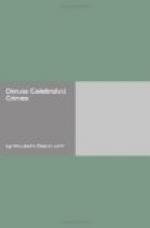“What a question, master!” answered the mason. “Work is so scarce that I am going back into the country this very evening.”
“Very well! Bring your tools, spade, and pickaxe, and follow me.”
They both went down to the cellar, and the mason was ordered to dig out the pit till it was five and a half feet deep. While the man worked, Derues sat beside the chest and read. When it was half done, the mason stopped for breath, and leaning on his spade, inquired why he wanted a trench of such a depth. Derues, who had probably foreseen the question, answered at once, without being disconcerted—
“I want to bury some bottled wine which is contained in this case.”
“Wine!” said the other. “Ah! you are laughing at me, because you think I look a fool! I never yet heard of such a recipe for improving wine.”
“Where do you come from?”
“D’Alencon.”
“Cider drinker! You were brought up in Normandy, that is clear. Well, you can learn from me, Jean-Baptiste Ducoudray, a wine grower of Tours, and a wine merchant for the last ten years, that new wine thus buried for a year acquires the quality and characteristics of the oldest brands.”
“It is possible,” said the mason, again taking his spade, “but all the same it seems a little odd to me.”
When he had finished, Derues asked him to help to drag the chest alongside the trench, so that it might be easier to take out the bottles and arrange them: The mason agreed, but when he moved the chest the foetid odour which proceeded from it made him draw back, declaring that a smell such as that could not possibly proceed from wine. Derues tried to persuade him that the smell came from drains under the cellar, the pipe of which could be seen. It appeared to satisfy him, and he again took hold of the chest, but immediately let it go again, and said positively that he could not execute Derues’ orders, being convinced that the chest must contain a decomposing corpse. Then Derues threw himself at the man’s feet and acknowledged that it was the dead body of a woman who had unfortunately lodged in his house, and who had died there suddenly from an unknown malady, and that, dreading lest he should be accused of having murdered her, he had decided to conceal the death and bury her here.
The mason listened, alarmed at this confidence, and not knowing whether to believe it or not. Derues sobbed and wept at his feet, beat his breast and tore out his hair, calling on God and the saints as witnesses of his good faith and his innocence. He showed the book he was reading while the mason excavated: it was the Seven Penitential Psalms. “How unfortunate I am!” he cried. “This woman died in my house, I assure you—died suddenly, before I could call a doctor. I was alone; I might have been accused, imprisoned, perhaps condemned for a crime I did not commit. Do not ruin me! You leave Paris to-night, you need not be uneasy; no one would know that I employed you, if this unhappy affair should ever be discovered. I do not know your name, I do not wish to know it, and I tell you mine, it is Ducoudray. I give myself up to you, but have some pity!—if not for me, yet for my wife and my two little children—for these poor creatures whose only support I am!”




